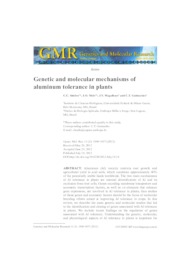Genetic and molecular mechanisms of aluminum tolerance in plants.
Genetic and molecular mechanisms of aluminum tolerance in plants.
Author(s): SIMOES, C. C.; MELO, J. O.; MAGALHAES, J. V.; GUIMARAES, C. T.
Summary: Aluminum (Al) toxicity restricts root growth and agricultural yield in acid soils, which constitute approximately 40% of the potentially arable lands worldwide. The two main mechanisms of Al tolerance in plants are internal detoxification of Al and its exclusion from root cells. Genes encoding membrane transporters and accessory transcription factors, as well as cis-elements that enhance gene expression, are involved in Al tolerance in plants; thus studies of these genes and accessory factors should be the focus of molecular breeding efforts aimed at improving Al tolerance in crops. In this review, we describe the main genetic and molecular studies that led to the identification and cloning of genes associated with Al tolerance in plants. We include recent findings on the regulation of genes associated with Al tolerance. Understanding the genetic, molecular, and physiological aspects of Al tolerance in plants is important for generating cultivars adapted to acid soils, thereby contributing to food security worldwide.
Publication year: 2012
Types of publication: Journal article
Unit: Embrapa Maize & Sorghum
Keywords: Organic acids, QTL, Regulatory factors, Tolerance, aluminum
Observation
Some of Embrapa's publications are published as ePub files. To read them, use or download one of the following free software options to your computer or mobile device. Android: Google Play Books; IOS: iBooks; Windows and Linux: Calibre.
Access other publications
Access the Agricultural Research Database (BDPA) to consult Embrapa's full library collection and records.
Visit Embrapa Bookstore to purchase books and other publications sold by Embrapa.

